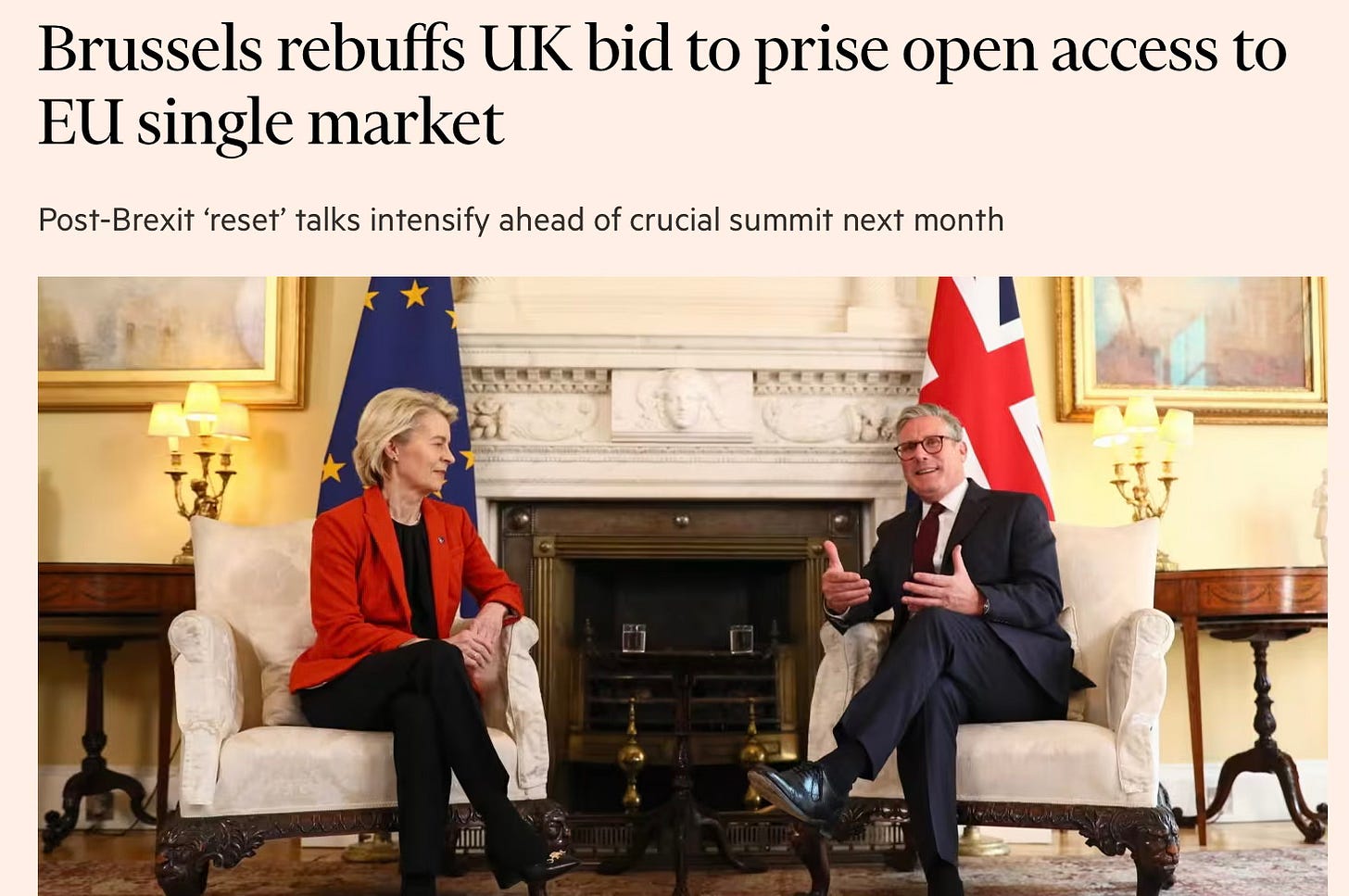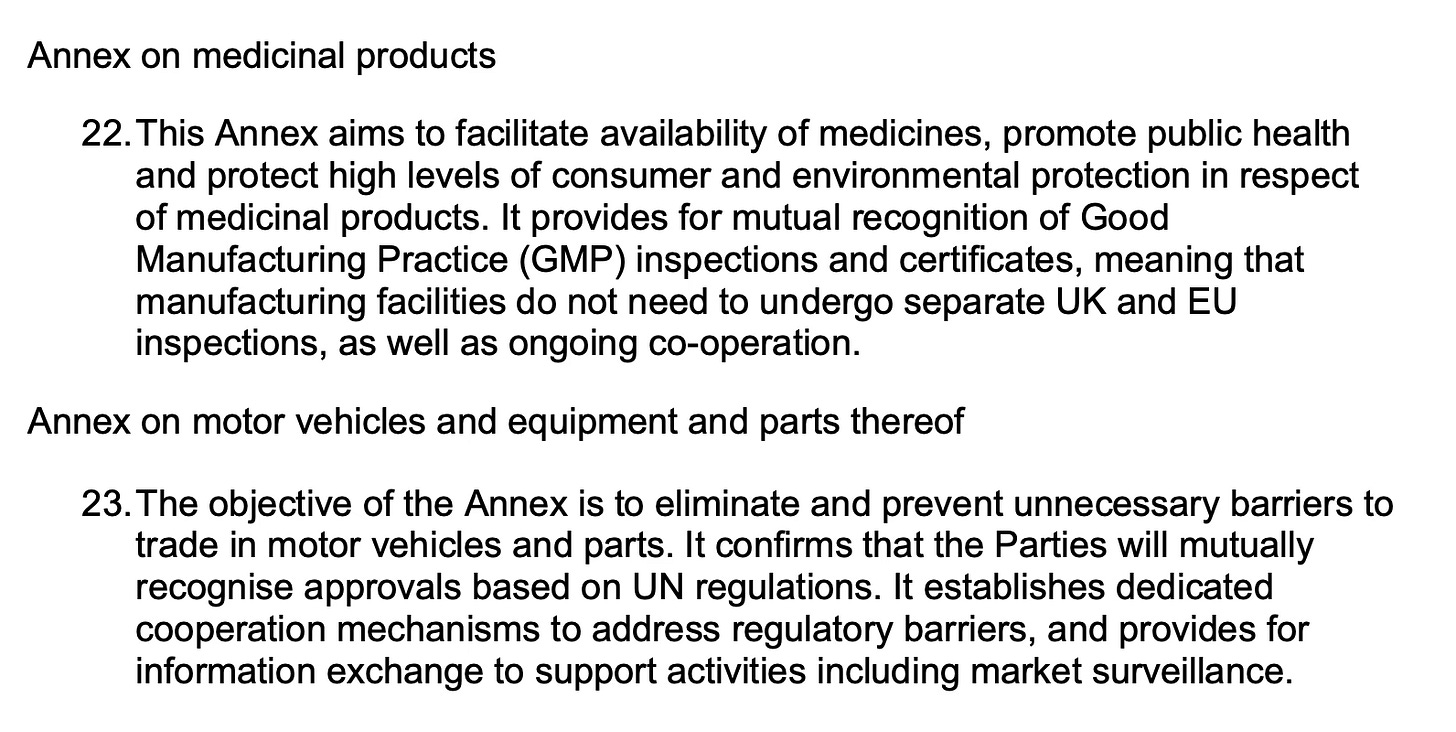Mutual Recognition
... of conformity assessment bodies
Last week, the FT reported that the EU rejected a UK attempt to reopen discussions about mutual recognition of conformity assessment bodies.
This had led some people on the internet to say things such as [paraphrasing] “Doesn’t the idiotic UK know that it can’t have single market access without freedom of movement, etc.”
Now, to be fair, this is indeed the reason for rejection given by “one EU diplomat” in the FT article:
Sir Keir Starmer, British prime minister, had sought a mutual recognition agreement with the EU on certifying product standards that would have cut red tape for British businesses sending goods into the bloc’s single market.
But France rejected the demand outright, according to EU diplomats, and there was general agreement the idea was a non-starter.
One EU diplomat said on Friday: “It’s not going to happen. Switzerland has this, but they pay into the EU budget and accept free movement.”
However, while it is true that the EU doesn’t want to do wholesale mutual recognition of conformity assessment with the UK, fears of “prising open the single market” is not the real reason.
But before we get to the real reason, what is mutual recognition of conformity assessment bodies? [You can skip this bit if you already know, but unless you’re an absolute nerd you probably don’t actually know.]
First, mutual recognition of conformity assessment bodies is not mutual recognition of regulation or standards.
By which I mean that we are absolutely not talking about the EU recognising that UK regulations or standards are equivalent to its own.
Rather, we are talking about the EU recognising that certain UK-based conformity assessment bodies can independently verify that a product submitted to them for testing conforms with European Union standards. Let me repeat that: European Union standards.
While third-party certification is not required for most products — most products allow companies anywhere in the world to self-certify that they meet EU standards, with the legal liability for conformity being placed on the person (usually the importer) who ultimately places it on the EU market — it is sometimes needed for more complex goods such as medical devices and heavy machinery.
If the EU agrees to mutually recognise another country’s conformity assessment bodies (either universally or in relation to specific products), this means that exporters in those countries can get the third-party certification they need a little closer to home. It also means that, in those instances where foreign countries utilise the same standards as the EU, companies are subject to less duplication, i.e. they just need to submit their product for testing once.
So it’s a cost saver for some businesses.
[Note: None of this has anything to do with border checks or any of the other things people have been lecturing me on over at Bluesky.]
Anyhow, why do we know that mutual recognition of conformity assessment bodies does not require the single market to be prised open?
That is because, in addition to Switzerland, the EU has already agreed to mutual recognition of conformity assessment bodies with the USA, Australia, New Zealand, Canada and Israel.
You will note that these are all countries that, to my knowledge, do not adhere to the four freedoms and, in the case of Australia and the USA, don’t even have an FTA with the EU. [I’ll get onto Switzerland shortly, which does, of course. have freedom of movement.]
In addition, the EU has agreed to some mutual recognition of conformity assessment bodies with the UK already, in respect of good manufacturing practice for pharmaceuticals and UNECE type approvals for automotives:
As an aside, it quite notable that lots of people who have a good grasp of the macro negotiation principle (UK won’t be treated as well outside as in) are often surprised when the EU still proceeds to agree something it deems to be in its material interest (e.g. the extension of A50; reopening the NI protocol; provisional application of the TCA; tweaking the Windsor Framework to allow medicines certified in GB to be placed on the market in NI; extending the grace period for EV rules of origin; etc)
Or to put it another way, if “splitting the four freedoms” was the fundamental concern, the EU wouldn’t be contemplating a veterinary agreement with the UK, which is far more trade liberalising and consequential than anything it might do on conformity assessment.
So why doesn’t the EU want to agree to mutual recognition of conformity assessment bodies with the UK?
Well, because it does not believe doing so is in its interest:
Autonomy and jobs. The main reason the EU didn’t want to discuss wholesale mutual recognition of conformity assessment bodies during the previous TCA negotiations is that it wanted to repatriate the testing capabilities and jobs into the EU. Prior to Brexit, a lot of product testing happened in the UK. It saw an opportunity for a land grab, and took it. (When people talk about the proximity risk — ie the risk is higher because the UK is nearby — this is what they actually mean.) The question now is how big a concern this is, given that the jobs that were going to move over to the EU have already moved.
Asymmetric impact. At the moment, the lack of mutual recognition is mainly impacting UK firms exporting to the EU and not vice versa. This is because the UK has taken the decision to unilaterally recognise both EU product markings (CE markings) and third-party certificates granted by EU-based notified bodies. This makes sense from a UK perspective, given the disruption changing this approach would cause, but it does mean that the UK doesn’t have very much leverage. Unlike sanitary and phytosanitary controls, where the gradual imposition of UK controls is starting to cause problems for EU exporters.)
Switzerland. I said I would address it. It is, of course, true that Switzerland has agreed to freedom of movement as part of its overall arrangement with the EU. Comprehensive mutual recognition of conformity assessment bodies is a part of this, and Switzerland has much more recognition than anyone else.
See my helpful table:
So yeah, the UK doesn’t get Swiss without all the bells and whistles, but Australia and Canada, for example, seem to be doing okay without them …
All in all, it’s a pretty similar dynamic to financial services equivalence. There is no real technical reason why the UK couldn’t be granted equivalence (which isn’t to say that people don’t make up reasons there is), the EU just doesn’t want to do it unless it has to (see: clearing houses) because it wants the jobs and control. [Again, before anyone shouts at me, I am not saying it is unreasonable to want jobs and control, I’m just saying that this is the actual reason.]
So I suppose my question is, given that wholesale mutual recognition of conformity assessment bodies is seemingly still not so appealing to the EU, are there narrower iterations that could be?
Of course, I don’t know the answer to this. But my starting point would be to build on one area—good manufacturing practice for medicines—where there is already some recognition.
A new paper by Cancer Research UK1 , “Nothing should stand in the way”, notes that a lack of recognition of the batch certification and release of medicines “creates additional costs and delays”.
Given that increased costs and delays in relation to medicines are obviously VERY BAD, you would hope there is some mutual interest in finding a solution here.
They also make the case for recognition in the context of clinical trial sponsorship and approvals, which, I quote, “Ultimately … means people with cancer across the whole of Europe will have earlier access to innovative treatment options.”
Let’s see …
Tariff Exemptions
While everyone is talking about Trump’s decision to exempt smartphones from his reciprocal tariffs, last week I found out about (thank you, Amy Porges!) another exemption: Nairobi Protocol Status.
Apparently, as a result of the aforementioned Nairobi protocol, imports of products that benefit the blind or other physically or mentally handicapper persons are exempt from Trump’s trade tariffs (both Section 301 and reciprocal duties).
Note: not legal or customs advice, etc etc.
Best wishes.
Sam
The eagle-eyed among you will notice that I am mentioned in the report’s acknowledgements. I am happy to confirm that I provided some feedback on the paper, but this was entirely unpaid.





And Swiss certifications are the gold standard